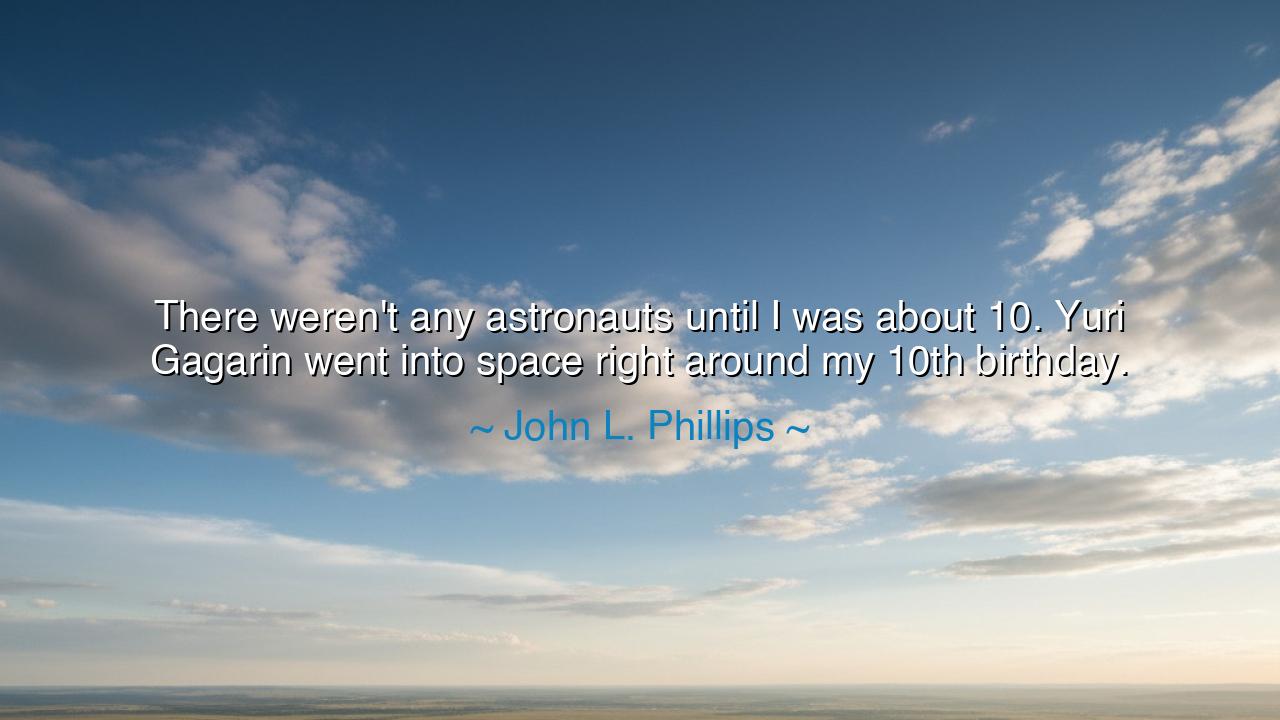
There weren't any astronauts until I was about 10. Yuri Gagarin
There weren't any astronauts until I was about 10. Yuri Gagarin went into space right around my 10th birthday.






Host: The quiet of the evening filled the room, as Jack sat at the table, his fingers resting lightly on his cup, reflecting on John L. Phillips’s words. Jeeny stood near the window, her gaze turned inward, contemplating the significance of the moment Phillips referenced.
Jeeny: “I’ve been thinking about what John L. Phillips said: ‘There weren’t any astronauts until I was about 10. Yuri Gagarin went into space right around my 10th birthday.’ It’s such an interesting way to look at how space exploration began to shape our world. For Phillips, the idea of astronauts and the space race was something that emerged during his childhood, at a time when it felt like an entirely new frontier was opening up.”
Jack: “Yes, exactly. Phillips is framing the birth of the space age as something that happened almost in real-time with his own development. Up until his 10th birthday, the idea of astronauts didn’t even exist. And then, all of a sudden, Yuri Gagarin becomes the first person in space, and everything changes. That must have been an incredible, almost magical moment for him—suddenly the world was no longer confined to Earth. It was like a new chapter for humanity.”
Jeeny: “Right. And I think it’s so profound how Gagarin's spaceflight was such a pivotal moment not just in history but in the minds of people, especially for children like Phillips. Gagarin represented something so new, so unimaginable to many people at the time. And for someone like Phillips, who was at the threshold of a new era, it must have sparked a sense of possibility—like the world was opening up, and there was no limit to what could be achieved.”
Host: The stillness in the room deepened as they both reflected on how monumental the space race was for people at the time. Jack’s fingers rested on the table, while Jeeny’s expression softened, thinking about how history unfolds in real-time and how certain events can have such a profound impact on an individual’s worldview.
Jack: “It makes me think about how the space race didn’t just change the course of history—it changed how people thought about what was possible. Before astronauts, space was a distant, unknown concept. But after Gagarin, space became something tangible, something achievable. For someone like Phillips, who grew up with this shift, the idea of being an astronaut wasn’t just a dream—it became a real possibility.”
Jeeny: “Exactly. And Phillips’s words highlight how space exploration became a defining cultural moment, not just for those involved, but for everyone watching. It opened up an entirely new realm of imagination and ambition. When people like Gagarin went into space, it wasn’t just an achievement for one person or one country—it was a shared moment of awe for the world. It changed the way people saw human potential.”
Jack: “And it’s interesting because when we look back at it, we see how it shifted the global narrative. Space exploration became an arena where science, technology, and human spirit collided. It wasn’t just about reaching a new frontier—it was about proving that the impossible was possible. And for kids like Phillips, that realization probably felt like a defining moment in their lives, a moment that made them believe that anything was possible if you set your mind to it.”
Jeeny: “Yes, and it’s amazing to think that, for someone like Phillips, the idea of becoming an astronaut didn’t exist until Gagarin’s flight. Suddenly, the future wasn’t just about following in the footsteps of past generations—it was about creating new paths in unexplored territory. And for children of that generation, space was a new horizon—a place where dreams could take flight.”
Host: The quiet in the room grew deeper, as they considered how moments like Gagarin’s flight don’t just mark a historical achievement—they define how generations see themselves and their potential. John L. Phillips had shown them how a single event can shape a person’s view of the world, propelling them to imagine things they may have never thought possible. Jack leaned back slightly in his chair, while Jeeny’s gaze turned from the window back to him, both understanding the magnitude of Gagarin’s flight and the impact it had on the world, especially on young minds.
Jack: “So, Phillips is really showing us that the moment Gagarin went into space, it wasn’t just about the achievement of one man—it was about opening the door to limitless possibility. It gave people, especially young people, the hope and belief that space, technology, and the future could be theirs to shape.”
Jeeny: “Exactly. It gave a generation the vision to think beyond the familiar, to imagine a world where even the sky was no longer the limit. Gagarin’s flight didn’t just mark the beginning of space exploration—it marked the beginning of a new kind of dreaming, where anything seemed possible.”
Host: The evening had fully settled in, the quiet understanding between them a reminder that moments of transformation in history don’t just change the world—they change the way we see the world. John L. Phillips had reminded them that Yuri Gagarin’s flight didn’t just launch a new era in space exploration; it launched an era of new possibilities for everyone, especially for young people who saw their futures in a completely new light. The world outside had darkened, but inside, there was light—a recognition that dreams can take flight when the world is opened up by a moment of awe and wonder.






AAdministratorAdministrator
Welcome, honored guests. Please leave a comment, we will respond soon